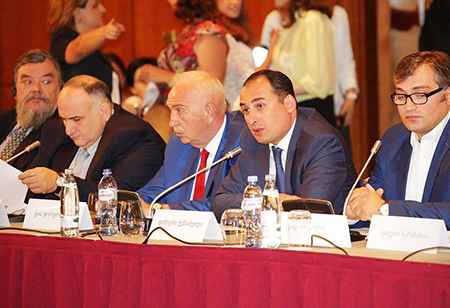What is the Government’s role in economic development?

What is the role of government in economic development of a country?
This is the main question and main topic of today’s international conference being held in Georgia’s capital Tbilisi.
Experts and university professors from Norway and Estonia are in Tbilisi attending the conference to share their experience and knowledge in achieving sustainable economic growth.
Enjoying the knowledge and the best experience that these professors have brought to Georgia is very important for us,” said Economy Minister Dimitry Kumsishvili.
During a series of economic forums we will gain the best experience and knowledge about how to develop our economy quickly. We want to achieve development of our country, our economy in the shortest period of time so our population can be better off,” he added.
Official figures released by the National Statistics Office of Georgia (Geostat) gave reason to be optimistic about Georgia’s future economic growth.
Georgia’s foreign trade has increased by 17 percent and the drop of remittances to Georgia was not fixed between January and July 2016,” said Deputy Economy Minister Nikoloz Gagua last week.
In the reporting period international net cash flow (excluding Foreign Direct Investments) increased and reached about $210 million USD while FDIs increased 30 percent in the first quarter of 2016. The trade balance was improved by $84 million in the first seven months of 2016,” he added.
Gagua also explained reasons why Georgia’s imports and exports had decreased and said expected more balanced trade figures in the coming months.

Today Georgia is hosting an international conference on the topic what is the government's role in economic development of the country. Photo by Georgia's Ministry of Economy.
Exports decreased by 12 percent and reached $1.12 billion, while imports also decreased by six percent and amounted to $3.86 billion. Export data is a nominal data and for a better analysis it is important to look at the real data where export dynamic is given excluding the price effect.
We should underline that a decline in exports was caused by the price effect. In the first and the second quarters we experienced practically zero decline while in June we had real growth of 2.9 percent,” Gagua said.
As for a reduction in imports, one positive thing we can take out of this is that the import of investment goods increased. Accordingly, the reduction comes to consumer and intermediate goods and this is a very healthy reduction,” he added.
Meanwhile increased international tourism was making a positive impact on the Georgian economy, said Gagua. Figures showed income generated from international tourism increased 13 percent, or by $130 million, in January-July 2016 y/y.
The larisation ratio, which measured the use of the domestic currency in the country’s economy, had also increased since March, said Gagua.
The Government has been working on a complex plan for the larisation ratio that should create incentives to increase the share of the Lari in Georgia’s economy. The role of larisation is huge in the fast and stable development of economy,” he stated.
Gagua said Georgia’s economic growth rate had improved and was fixed at three percent.
We forecast to enjoy 3.5 percent economic growth this year which is not a high rate however it will be one of the highest in Eastern Europe,” he said.
The Deputy Minister also spoke about the inflation rate in Georgia and said it had been gradually dropping, which was bringing some benefits to the people of Georgia.
 Tweet
Tweet  Share
Share